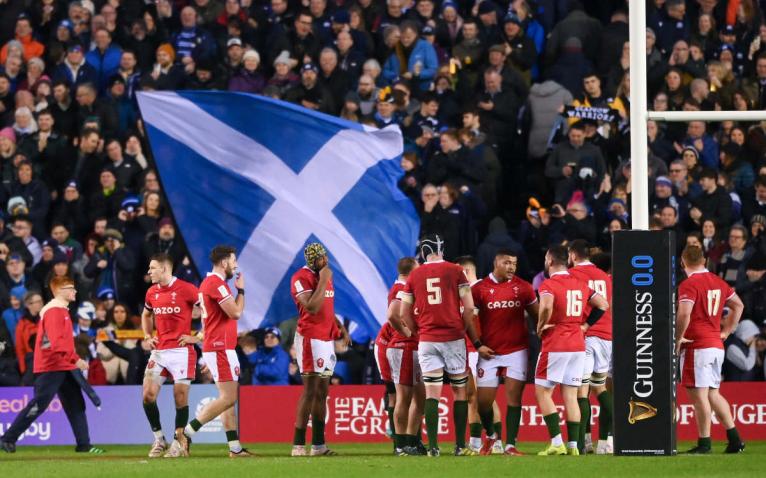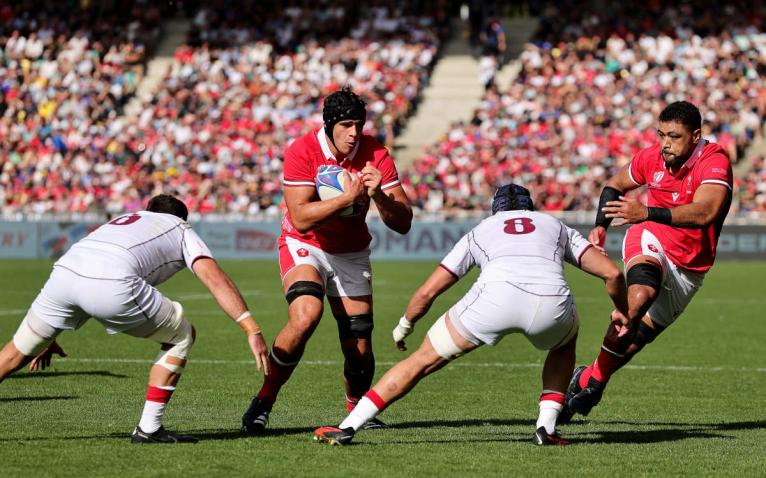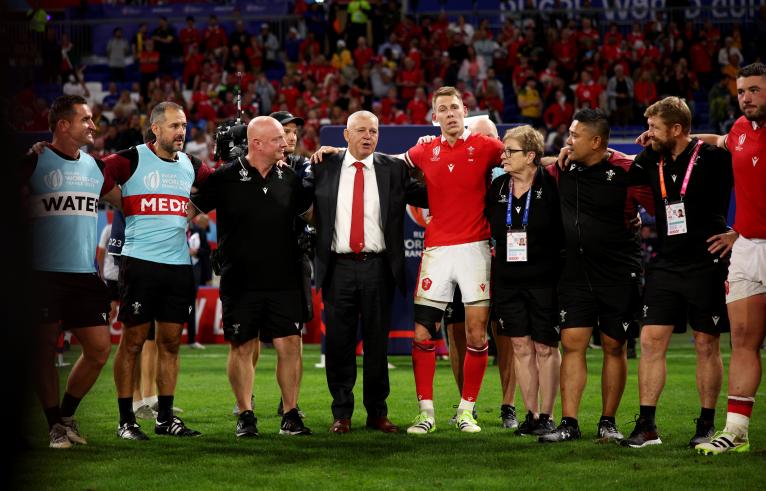How important is ground advantage to a team? Scotland insist the Principality Stadium factor hasn’t been a major talking point in camp this week, but their last win over Wales at the Cardiff venue came so long ago that Bill McLaren was on TV commentary duty.
Tony Blair was prime minister, Charlton Athletic were comfortably placed in football’s Premier League and Rishi Sunak hadn’t long left university.
For sure, 22 years is a long wait between drinks.
The match in 2002 is remembered for being McLaren’s last in a working capacity rather than the quality of the play, with the two sides coming up with a shocker to send the amiable legend into retirement after a 50-year stint behind the mic.
Matters hit a low for Wales when their forwards failed to jump at a home lineout, instead staying rooted to the floor like statues. A journalist later ribbed Steve Hansen, Welsh coach at the time, saying: “I see Wales have a new lineout tactic – not contesting on their own throw.” Cue a New Zealander looking as if he’d just heard that a lorry had reversed over his car outside the ground.
Scotland weren’t much better, with their backs predictable and ponderous, not looking as if they could spell the word ‘creativity’ if they were given 50 goes.
We can only hope for better this weekend.

Despite having lost 11 games in a row against Wales in the Welsh capital, the Scots will travel to the Principality Stadium for the round one Six Nations clash on Saturday as favourites, with the hosts having been hit by injuries, retirements and unavailabilities. No-one in either camp will say it, but it’s hard to imagine the boys in dark blue shirts will ever have a better chance of ending their Cardiff hoodoo.
Mindset will be important – of course it will.
“You have to shut out the noise from the crowd and look to play so well that you effectively take refereeing decisions out of it. Ultimately, it’s 15 against 15 on a patch of grass. It shouldn’t matter where the match is being played,” Justin Marshall once said.
It probably helps to be part of a great New Zealand side, though, as the scrum-half was.
And few have Marshall’s armour-plated sense of self-belief, anyway.
But what about playing in the ground on the east bank of the River Taff? The former England No. 8 John Scott once reported that when the Red Rose team played Wales in Cardiff in 1979 all he could hear in the dressing room beforehand was the knocking of knees.
Different times.
Wales in 2024 have seen a significant section of their potential side ripped out, with Liam Williams unavailable at full-back and Dewi Lake and Taulupe Faletau unfit to contest the hooker and No. 8 positions. Dan Biggar is also no longer around to run the side from fly-half. That’s 15, 10, 2 and 8, pretty much the spine of the team, all hit by turbulence, something Warren Gatland could have done without.
Youngsters have been to the fore at the squad’s base in the Vale of Glamorgan, with one or two looking as if they might need parental permission to stay out after dark. The captain, Dafydd Jenkins, is just 21, while Cameron Winnett and Mason Grady are the same age, with Mackenzie Martin even younger. In all, 11 players are 23 or under. Suddenly George North is among the squad’s oldsters, a sobering state of affairs for those of us with more miles on the clock than we’d prefer, who can remember North’s Test debut as if it were yesterday.

But that is where Wales are at, the beginning of a rebuilding job aimed at making them fit for purpose for the 2027 World Cup.
For Gatland, the immediate challenges are daunting. Can he confound the odds and somehow fast-forward the development process at Test level? Or is it an iron law that says such matters require patience and time to deliver the desired results? We are about to find out.
Some are detecting the potential for concerns, among them the former fly-half Jonathan Davies, who, ahead of team selection for the Scotland game, reflected on “a sad indictment of the Welsh game that we can’t name a 10 or a 15”. The dual-code great had long pointed out that Welsh rugby had failed to bring through a long-term successor to Williams and Leigh Halfpenny at full-back, with much the same applying to the situation at fly-half and Biggar. It has left Gatland relying on inexperience in specialist and key roles.
Then there’s tight-head prop, where Wales are entering the championship minus a proven Test-class scrummager. This, just months after South Africa double-underlined the importance of set-piece power when muscling their way to yet another World Cup triumph. Wales will not meet any side over the coming weeks boasting such strength as the Springboks in the pushing and shoving game, but, still, most of their rivals will quietly hope to pressure Gatland’s team.
As a former hooker, the head coach will be familiar with the old adage that suggests if you don’t have a scrum, you don’t have a chance. Somehow, he needs to fashion a passable set-piece operation, and quickly.
And to avoid nightmares, he probably needs to avoid watching the tape of Wales’ encounter with the Scots in 1987. Then, the visitors had been forced into a late change when Stuart Evans broke a foot during a run-out and Maesteg’s Peter Francis came in for his Test debut.
Francis had been a fine player at club level, a bundle of energy who didn’t stop working from minute one to minute 80. But Test rugby is seven or eight floors up and so it was that the west Wales farmer found the going especially tough in the scrums, with David Sole showing why he was among the world’s finest loosehead props at the time. The following season’s Rugby Annual for Wales reported that the Scottish eight “pushed the Welshmen all over the paddock”. Indeed, at one point, the Welsh pack looked as if they might be shoved back the length of Princes Street, so dominant were their opponents.

Amid the carnage, referee Keith Lawrence said to Wales lock Bob Norster: “I’m not happy with your tight-head prop.”
Norster’s reply? “You’re not happy? How do you think I feel?”
The big man always did a nice line in gallows humour.
Welsh supporters will hope there is no need for such a quality from any of the current crop over this campaign.
But they have Gatland in the red corner, which is a plus. He is someone who sees advantages in disadvantages and hates to lose almost as much as he loves to win. The Kiwi’s first priority will be to make the Wales class of 2024 hard to beat, but he will also be realistic: his team is a new one and success in sport usually takes time to bring about.
Picking Jenkins as captain is a bold call, given the Exeter Chiefs player’s tender years, but anyone who has watched the Devon team this season will know their Welsh skipper is made of the right stuff. He is a forward who chases causes others see as lost, who keeps going when all around are tiring, who unfailingly puts his body on the line. Gatland will feel he is someone Wales can build a pack around over the coming years.
There are other promising youngsters in the set-up, while over the season Wales will look to experienced campaigners such as Will Rowlands, Adam Beard, George North, Nick Tompkins, Gareth Davies, Tomos Williams, Aaron Wainwright and Josh Adams to support the man wearing the armband.

The coaches will adopt a step-by-step approach and they need the public to show patience and understanding. The trouble is those are traits not always evident west of Bristol after defeat for sides in red. Sometimes, even the dogs in the street seem ill-tempered if Wales lose at rugby.
But the first game is important. Win and the team can travel to Twickenham the following weekend in good heart. Lose and the Welsh chandelier of hope for the season will be in danger of crashing to the floor. That’s the way it works.
Can Gatland and a young squad defy expectations for the season?
As well as anyone, the coach will know it won’t be easy.



Comments
Join free and tell us what you really think!
Sign up for free